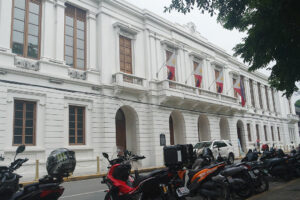Gov’t fully awards bond offer as yields drop on rate cut bets
THE GOVERNMENT made a full award of the reissued Treasury bonds (T-bonds) it offered on Tuesday at a lower average rate amid strong demand as investors locked in returns amid expectations of further rate cuts by the Philippine central bank. The Bureau of the Treasury (BTr) raised P15 billion as planned via the reissued seven-year […]

THE GOVERNMENT made a full award of the reissued Treasury bonds (T-bonds) it offered on Tuesday at a lower average rate amid strong demand as investors locked in returns amid expectations of further rate cuts by the Philippine central bank.
The Bureau of the Treasury (BTr) raised P15 billion as planned via the reissued seven-year bonds it auctioned off on Tuesday as total bids reached P86.38 billion, or almost six times the amount on offer.
This brought the outstanding volume for the series to P234.7 billion, the Treasury said in a statement.
The bonds, which have a remaining life of four years and seven months, were awarded at an average rate of 5.508%. Accepted yields ranged from 5.5% to 5.525%.
The average rate of the reissued papers fell by 55 basis points (bps) from the 6.058% fetched for the bonds when they were last awarded on Sept. 10. This was also 99.2 bps lower than the 6.5% coupon rate for the issue.
It was likewise 8.8 bps below the 5.596% quoted for the same bond series and 6.3 bps lower than the 5.571% fetched for the five-year bond at the secondary market before Tuesday’s auction, based on PHP Bloomberg Valuation Service Reference Rates data provided by the BTr.
“The 7-year Treasury Bond (07-67) reissuance attracted strong demand, prompting the Auction Committee to fully award the security at today’s auction,” the BTr said on Tuesday, adding that the average rate fetched for the papers was lower than what was quoted for the previous reissuance and the prevailing secondary market rates.
Investors swamped the bond offer as they wanted to lock in relatively higher yields before the Bangko Sentral ng Pilipinas (BSP) eases its policy stance further, a trader said in a text message.
BSP Governor Eli M. Remolona, Jr. last week said the Monetary Board could slash benchmark interest rates by 50 bps more this year and deliver two more 25-bp cuts at its next two meetings scheduled for Oct. 16 and Dec. 19.
The central bank began its easing cycle in August, cutting its policy rate for the first time in nearly four years by 25 bps to 6.25% from the over 17-year high of 6.5%.
On Monday, Mr. Remolona said that while the BSP has the space to reduce borrowing costs by 50 bps in one meeting, this would only be done in a “hard-landing” scenario.
The upcoming reduction in banks’ reserve requirement ratios (RRR) also caused T-bond yields to go down, as this would inject fresh liquidity into the financial system, Rizal Commercial Banking Corp. Chief Economist Michael L. Ricafort said in a Viber message.
The BSP last month announced that it would reduce the RRR for universal and commercial banks and nonbank financial institutions with quasi-banking functions by 250 bps to 7% from 9.5% effective on Oct. 25.
It will also cut the RRR for digital banks by 200 bps to 4%, while the ratio for thrift lenders will be reduced by 100 bps to 1%. Rural and cooperative banks’ RRR will likewise go down by 100 bps to 0%.
The RRR is the portion of reserves that banks must hold onto rather than lending out. When a bank is required to hold a lower reserve ratio, it has more funds to lend to borrowers.
Mr. Remolona on Monday said big banks’ RRR could be brought down to as low as zero before his term ends in 2029. He earlier said the BSP wants to cut this ratio to as low as 5% from a high of 20% in 2018 as the country’s reserve requirements are among the highest in the region.
The BTr plans to borrow P145 billion from the domestic market in October, or P100 billion through Treasury bills and P45 billion via T-bonds.
The government borrows from local and foreign sources to help fund its budget deficit, which is capped at P1.48 trillion or 5.6% of gross domestic product this year. — A.M.C. Sy























